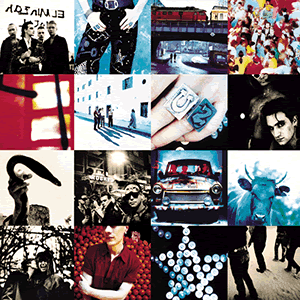In the new documentary From the Sky Down, Bono and The Edge point to one moment during the writing of the song “One” that served as a breakthrough during the previously fruitless sessions that spawned Achtung Baby. Edge couldn’t decide between two versions of a chord progression he had written, so Bono and Brian Eno suggested he overlay them. “It felt like something powerful entered the room,” Edge said. “One” is the quintessential U2 song, and it almost never happened. One of the six CDs included in Achtung Baby‘s super-deluxe twentieth anniversary box set is a disc called Kindergarten, which constructs an alternate-universe version of the album out of demos and early takes. The version of “One” on that disc is lyrically and melodically basically a finished product, except it features only one of Edge’s two guitar tracks. The difference is monumental. There’s a good chance “One” wouldn’t have become iconic enough to serve as a namesake for Bono’s charity if they hadn’t tried out those two guitar patterns on top of each other.
Achtung Baby is the rarest kind of classic, a daring reinvention in sound and style by a band about as famous as any band could be, an album whose aims are topped only by the degree to which it succeeds at meeting all of them. U2 became one of the biggest musical acts on the planet with the release of their fifth album, The Joshua Tree, in 1987. But the subsequent world tour chronicled by the film Rattle and Hum saw a band on the verge of collapsing under the weight of its own expectations every night, playing stadiums and appearing on the cover of TIME but becoming increasingly uncomfortable with what they were coming to represent. They had backed themselves into a tight corner, with no choice other than hitting the reset button.
In From the Sky Down, Edge describes the band’s new approach as “taking the humanity out so that the humanity we leave in means more.” If anything, however, the introduction of electronics into the U2 aesthetic served to make them more human than they were during the Joshua Tree period. On Achtung Baby, U2 balance their personal expectations with their ear for the shifting musical landscape as well as any band ever has. “Zoo Station” and “The Fly” seamlessly marry grunge to the industrial music Edge had taken to in the late ‘80s. “Mysterious Ways” is credible as white funk and devastating as a rock song. “One” and “Who’s Gonna Ride Your Wild Horses” prove that abandoning the stadium-rock mentality doesn’t mean they can’t still write choruses big enough to fill them, and “Tryin’ to Throw Your Arms Around the World” and “Love is Blindness” prove that they’re just as capable of aiming smaller.
The bonus material on discs five and six of the box set (which also includes Achtung Baby’s severely underrated 1993 follow-up Zooropa and two pointless discs of remixes that likely won’t be of much use even to die-hards) only serve to illuminate how much had to go right for the album to be as good as it was. The B-sides disc features “Lady With the Spinning Head” and “Salome,” both of which were stripped for parts for the songs that ended up on the album. These are fine songs in and of themselves, but hearing riffs and melodies from “Ultraviolet” and “The Fly” in the context of “Spinning Head” only make you appreciate more how much they were made for the songs they ended up as. The Kindergarten disc of demos turn Achtung’s best songs into a game of “spot the influence.” Hearing “Even Better Than the Real Thing” as a Rolling Stones homage and “Who’s Gonna Ride Your Wild Horses” as a Springsteen rip again reiterate how impressive the finished products are. The original, seven-minute version of the album’s gorgeous closing track, “Love is Blindness,” is worth the price of admission here.
The reason Achtung Baby is the most enduring work of U2’s career and one of the defining rock albums of the last quarter-century is how natural the band made this radical transformation sound. The change in sound was labored over and almost broke down several times, but the end result was something both utterly unlike anything the band had recorded to that point and completely of a piece with the rest of their output.

